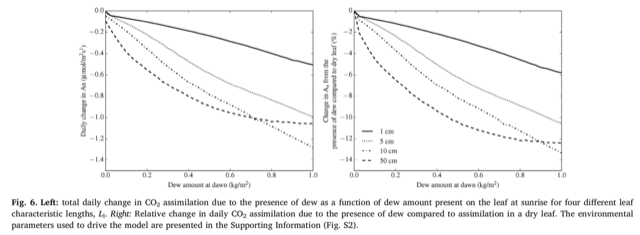Dew deposition suppresses transpiration and carbon uptake in leaves

Gerlein-Safdi, R., et al. (2018) “Dew deposition suppresses transpiration and carbon uptake in leaves”, Agricultural and Forest Meteorology, doi:10.1016/j.agrformet.2018.05.015.
Abstract:Dew deposition occurs in ecosystems worldwide, even in the driest deserts and in times of drought. Although some species absorb dew water directly via foliar uptake, a ubiquitous effect of dew on plant water balance is the interference of dew droplets with the leaf energy balance, which increases leaf albedo and emissivity and decreases leaf temperature through dew evaporation. Dew deposition frequency and amount are expected to be affected by changing environmental conditions, with unknown consequences for plant water stress and ecosystem carbon, water and energy fluxes. Here we present a simple leaf energy balance that characterizes the effect of deposition and the evaporation of dew on leaf energy balance, transpiration, and carbon uptake. The model is driven by five common meteorological variables and shows very good agreement with leaf wetness sensor data from the Blue Oak Ranch Reserve in California. We explore the tradeoffs between energy, water, and carbon balances for leaves of different sizes across a range of relative humidity, wind speed, and air temperature conditions. Our results show significant water savings from transpiration suppression up to 25% for leaf characteristic lengths of 50 cm. CO2 assimilation is decreased by up to 12% by the presence of dew, except for bigger leaves in windspeed conditions below 1 m s−1 when an increase in assimilation is expected.
